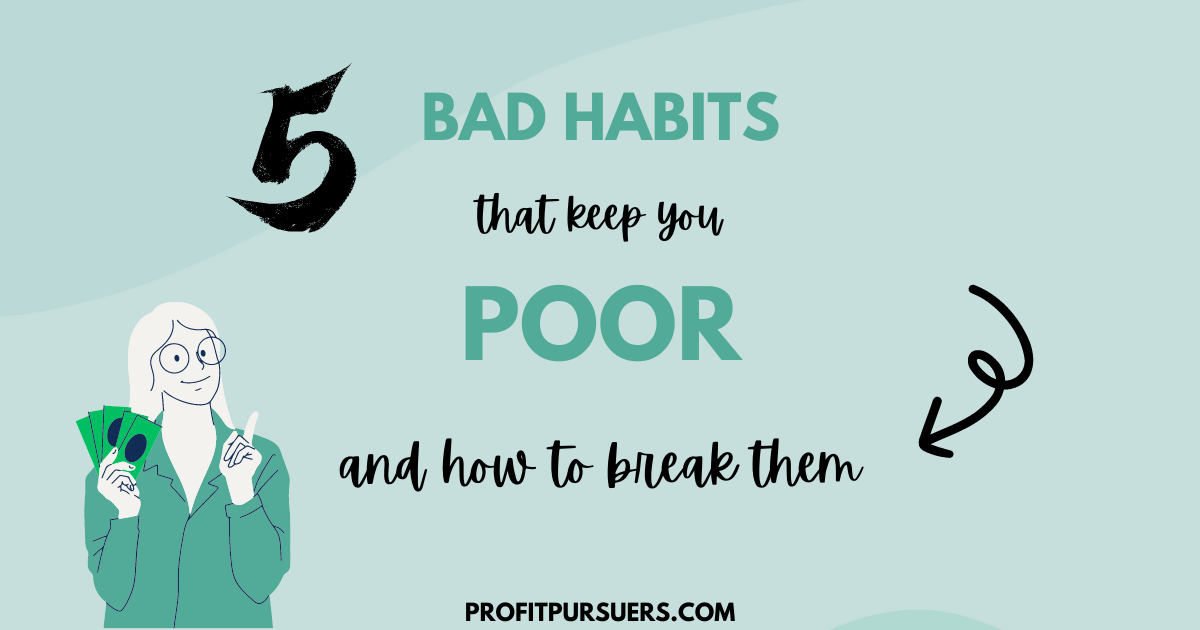I’m confident to say that each and every one of us has guilty pleasures!
But as soon as these habits involve spending money, it becomes difficult.
In fact, bad financial habits prevent many people to build significant wealth in their lives.
Isn’t that a pity?
Though some of you may know their guilty pleasures, there are most certainly habits that you don’t identify as bad yet!
This post is for you!
I want you to use this post to identify your bad habits that keep you poor.
Discover 5 bad habits that keep you poor and how to break them.
Table of Contents
5 Bad Habits that Keep You Poor (and How to Break them)
5 Bad Habits that Keep You Poor (and How to Break them)
For those of you, who are short on time, here is a quick break down of the top 7 bad habits that keep you poor:
- Impulse Buying
- Scrolling through Social Media All Day Long
- Failing to Save and Invest
- Procrastination
- Ignoring Debt
1. Impulse Buying
You walk into a clothing store and see a wonderful jacket that is on discount.
Though you don’t need a new jacket and can’t afford it either, you spontaneously decide to buy it.
Retailers are super skilled at creating this sense of urge to buy something (e.g. through discounts).
And here is the problem: Buying things you don’t need and don’t have the money for.
These unplanned expenses can quickly add up, leaving you with little to no savings and a cluttered home filled with items you rarely use.
Sounds bad, right?
What can we do against it?
How to Break It: Honestly, I’ve been making impulse purchases myself. But what seem to be a highly effective method to break this habit is setting yourself a waiting period:
If you see something you want, wait 24 hours before buying it.
Why?
This gives you time to assess if it’s a necessary expense or just an impulsive desire.
Another tip I can give you is creating a shopping list before you set foot into any store – and to stick to it by any means!
2. Scrolling through Social Media All Day long
Just by looking at it, this sounds like a very bad habit.
And it definitely is.
Yet many people tend to spend hours over hours on social media platforms.
And I have to admit: Time flies when being on Instagram, TikTok, …
And that’s because of a simple yet dangerous reason: Algorithms!
Every social media platform has its own mechanisms to keep you engaged in new content.
The worst about it? Social media posts rarely give you any value. Because let’s be honest who remembers a clip on TikTok you’ve seen a couple of hours ago?
In order to build wealth, we have to understand one crucial part: Time is our biggest asset!
Accordingly, we have to cut any time-wasting activities as much as possible.
And in most cases a big part of that is your social media behavior.
How to Break It: Well, the most effective approach would be deleting social media apps from your smartphone.
But you can start by downloading screen time limiting apps. These apps can be a great first step to reduce your time on social media platforms.
3. Failing to Save and Invest
Living from paycheck to paycheck without saving for your future is a dangerous habit.
Why?
Well, it leaves you unprepared for emergencies and without any savings it is hard to seize investment opportunities that can grow your wealth.
Without savings, unexpected expenses can force you into debt (see below), and missing out on investment opportunities can result in lost potential for financial growth.
How to Break It: Try to start an emergency fund and aim to save at least three to six months worth of living expenses.
You can also set specific savings goals and create a plan to achieve them.
Once you have some money left, think about different types of investments: stocks, bonds, and real estate, to increase your wealth!
4. Procrastination
Let’s be honest: Nobody willingly loves to deal with their finances.
What do people do with uncomfortable tasks?
Putting off things until tomorrow. Tomorrow becomes in a week and a week a month, a month …. you get it!
Don’t do this!
Putting off financial decisions, such as saving, investing, or creating a budget, can lead to missed opportunities and increased stress.
Procrastination often results in reactive rather than proactive financial management.
Everything just seems to happen all of a sudden!
Just think of an assignment you put off until the very last day. You end up writing everything under pressure without time for mentioning important details.
It’s really not that different with your financial duties!
When you delay important financial tasks, you may end up making hasty decisions under pressure, leading to suboptimal outcomes.
In the worst case, procrastination can even result in penalties and fees for late payments, leaving you with further financial burdens.
So I think we agree that procrastination is bad!
But what can we do against it?
How to Break It: A strict deadline is key:
Set specific financial goals with deadlines. Break tasks into smaller, manageable steps and tackle them one at a time.
If you’re not good in sticking to deadlines (like me too…), consider using tools and apps to remind you of important deadlines. There are plenty of them in your AppStore such as Structured-Daily Planner.
What also helps is to create a routine for handling your financial matters: Set aside time each week to pay bills, review your budget, and track your progress towards financial goals.
5. Ignoring Debt
Taking on debts for useless things is one of the reasons many people stay poor!
If you’re already in this situation: Don’t worry I got you (see down below).
The best thing we can do is stop ignoring our debts!
That’s because ignoring debt leads to accumulating interest and fees, making it even harder to pay off.
Debt can also damage your credit score, making it more difficult to obtain loans for important purchases like a home or car.
And apart from the effects on your wealth, being in debts just feels uncomfortable!
At the end of the day, we want to pay off debt fast!
How to Break It: Analyze your debt situation and create a plan to pay it off.
Try to focus on paying down high-interest debt first.
Develop a repayment strategy, such as the snowball or avalanche method, to systematically eliminate your debt.
And of course:
Avoid taking on new debt while you are working on paying off existing balances.
Related post:
The Takeaway
At the end of each of my posts I provide a short takeaway. Just to make sure you remember everything you learned today! 🙂
Here are the key advice I want to give you for building wealth:
Impulse buying leads to purchases you don’t need and don’t have the money for.
Set yourself a waiting period of 24 hours to before buying something!
Don’t spend hours on social media, this is just time wasting!
Instead, use your time for building wealth.
Remember: Time is our biggest asset!
Try to focus on saving money for emergencies and seize investments opportunities for building wealth!
Set yourself saving goals and an emergency fund to get started!
It is crucial to deal with your financial tasks quickly to avoid unpleasant surprises.
Set yourself deadlines for specific financial tasks.
Apps may help you sticking with your deadlines!
Paying off debts for useless things, is a huge factor that keeps many people poor!
If you’re already in this situation, here are some quick tips:
- Analyze your debt situation
- Pay off high-interest debts first
- Develop a repayment strategy
For more insightful advice on paying off debt faster, consider reading this post!
Final Thoughts
I hope you could identify some of your bad habits and now start breaking them!
You got this!
If you have any questions, feel free to get in touch in the comment section below or write me an email!



